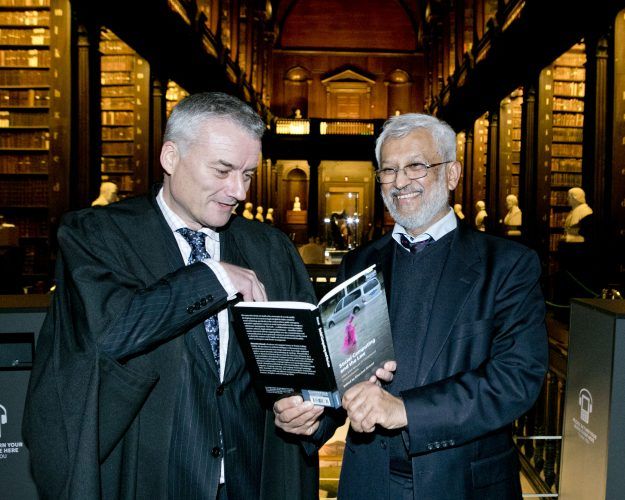In the age of GDPR, how can social computing data be legally used?
Posted on: 18 December 2018
An important new book, Social Computing and the Law, which provides insight into the legality of using big data for social computing following the implementation of the European Union General Data Protection Regulation (GDPR) was launched in Trinity College Dublin this week.

Social Computing and the Law, published by Cambridge University Press and edited by Chair of Computer Science at Trinity, Professor Khurshid Ahmad, was launched by Provost of Trinity, Dr Patrick Prendergast, at a special event in the Old Library.
In 2016 the EU finalised the GDPR, a regulation for all European Union Countries, which applies to the provision and use of digital media, including social media. This regulation came into effect in May 2018. During 2014-2017, Professor Ahmad coordinated the EU research project Slándáil, researching how social media data can be used for emergency management. As part of this project, four legal professionals from Germany, Italy, Ireland and the UK were engaged to develop a clear understanding of the new GDPR. Shane Finan, Trinity, managed the Slándáil project.
During emergencies such as major natural disasters, data can be valuable to emergency services, but it is abundant and hard to interpret. Systems that manage this type of interpretation of big data must adhere to legal and ethical standards of practice. This book has been written to address specifically how social computing data can be used in emergency management and to explore more broadly how the GDPR affects big data interpretation.
Social Computing and the Law sets itself at the crossroads of several rapidly developing areas of research in legal and global studies related to social computing, specifically in the context of how public emergency responders appropriate content on social media platforms for emergency management.
Computer science and ethics researchers at Trinity collaborated to develop an understanding of the ethical challenges of using such data. UK-based legal researcher, Taiwo Oriola (University of Ulster), writes about internet laws, including ownership of personal data; German judge and copyright expert, Christian Berger (University of Leipzig), writes about copyright laws and the exceptions and limitations to copyright ownership; expert in human rights, Professor Paolo De Stefani (University of Padua), gives an overarching view on the importance of the EU Fundamental Rights Framework in using online data.
The input from Professor Linda Hogan (Trinity College Dublin) and her team on matters of ethics and morality was essential to the project and has been recorded in the book. Finally, methods for legally using social computing streams are laid out by Head of Technology and Innovation at Arthur Cox Solicitors Dublin, Rob Corbet (partner).
Professor Khurshid Ahmad said:
Our book demonstrates the power of collaborative effort across the EU to address intangible problems. In our case, the intangibility comes from how proper uses of social computing data can make the difference between life and death, especially for vulnerable people.
Unfortunately, social computing data has been abused, sometimes for little gain, and considerable loss of reputation. Our book shows how we have adapted the rigours of GDPR for the potential use of innovative and disruptive technologies like social computing.
For further information about the book, see here.
